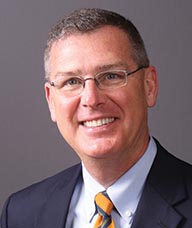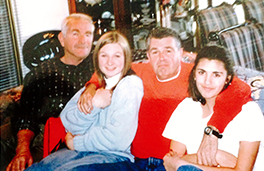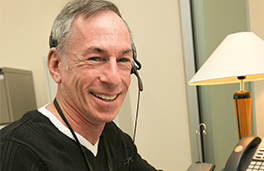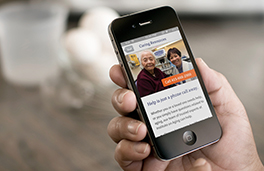Smart Slider 2 – widget
Newsletter
Letter from the President
“When I get overwhelmed I try to spend time talking to my mom about her life, her memories of her childhood and family. When she smiles, it makes my heart smile and I don’t feel so overwhelmed.” —Debbie M.

When you think of the Institute on Aging, you probably picture the
vulnerable adults who rely on our services due to age or disability, but there’s another part of the picture as well: the family members who voluntarily care for someone they love. We’re here for them too, and this edition of our newsletter is dedicated to them.
Only 11 percent of caregivers are paid for the help they provide. If you’re one of the 52 million Americans who share in the responsibilities (and, I hope, the rewards) of caregiving, we salute you.
Please remember, if you need us, we’re here for you. Read about our services at www.ioaging.org or call us at CONNECT: 415.751.4111. Also browse through the stories in this newsletter. I think you’ll find inspiration and ideas
to make the experience of caregiving easier and even more gratifying.
Easing Bob’s Alzheimer’s Nightmare
 Bob Barcewski and Eddy Gordillo had a wonderful life: A happy home, true love and two healthy daughters they raised together. Bob thought he was the luckiest guy in the world. Then Eddy descended into Alzheimer’s disease, and everything unraveled. Bob puts it like this, “Imagine a nightmare in which your life is like a movie running backwards. Eddy became more and more childlike—the opposite of the girls growing up.” Eddy was the love of Bob’s life, but the burden grew heavier every day.
Bob Barcewski and Eddy Gordillo had a wonderful life: A happy home, true love and two healthy daughters they raised together. Bob thought he was the luckiest guy in the world. Then Eddy descended into Alzheimer’s disease, and everything unraveled. Bob puts it like this, “Imagine a nightmare in which your life is like a movie running backwards. Eddy became more and more childlike—the opposite of the girls growing up.” Eddy was the love of Bob’s life, but the burden grew heavier every day.
“At each stage that he regressed, I was always caught off guard,” Bob says. He coped the best he could, but at one point he injured himself lifting Eddy and ended up in the ER. “I was pretty close to physical exhaustion.” Who knows what might have happened if he hadn’t connected with Institute
on Aging?
“From the first day, it was a godsend,” he says. “I got connected to a care manager and we went from there.” Eddy’s decline grew no less terrible, but Institute on Aging made life better for both of them. At last, Bob could breathe again. In the beginning Eddy came three days a week to the Institute’s Adult Day Club for people with early-stage memory loss. “The activities were great.” Later, he transitioned to the Institute’s other Day Club, for people with more advanced challenges. “I was still working and they would pick him up in the van,” Bob recalls. “Someone came to the house to cook and clean—they were amazing. They would have bathed him too but I wanted to do that myself.”
This past spring, Eddy passed away. Bob still grieves, of course, but at the same time he looks back on the experience with gratitude. “This disease is overwhelming, but (at Institute on Aging) you seem to anticipate what’s needed and make it happen. I’m so glad you’re there.” We are too, Bob.
We are too.
Free App Earns Applause
No matter how much help you receive from Institute on Aging and family, when you’re responsible for the care of an older or disabled adult, the details can overwhelm you. So many medications, appointments, tasks, contacts, photos, doctors’ notes and personal observations to organize and update, and so much to share with relatives, friends and helpers! No wonder professional and family caregivers are relieved and grateful to have Institute on Aging’s new app: Senior Care Manager.
Introduced in the fall of 2013, the Senior Care Manager app is a sophisticated but simple software application you may download for free to your Apple iPhone or iPad. This app’s powerful tools help you organize all of the above. You control who sees what and who may add to the information.
In less than a year, 3,000 people have downloaded Senior Care Manager. Look what they’re saying:
“Truly an amazing app. Really simple to use, but so powerful.” – Eric M.
“I love this app. . . . Thank you for making it available.” – Robyn P.
“This has been a tremendous help for me. It’s just wonderful. I love it–thank you!” – Nancy M.
Check out the Institute on Aging Senior Care Manager app yourself if you haven’t already. It’s at the Apple Store (or text “Aging” to 742864) or at ioaging.org. This app’s a winner. And it’s free!
When to Ask for Help
 If you are caring for a loved one with dementia, frailty or a disability, don’t wait.
If you are caring for a loved one with dementia, frailty or a disability, don’t wait.
Call CONNECT: 415.750.4111. . .
- If you are exhausted from the workload and stress.
- If you work outside the home and don’t want to leave your loved one alone.
- If you are having family disagreements about what to do.
- If you are facing tough decisions alone.
- If you need help or information but don’t know who to ask.
We understand. We care. Moreover, we can help.
Feeling Sandwiched In?
Try These Tips
Mary Jo is one of the 15 percent of all Americans aged 40-59 who are caring for both a parent and children. As part of the “Sandwich Generation,” she feels the squeeze, but the pressure is lighter because she and her family take these steps:
- Hold family meetings. Take notes and share them right away. Split up the task list and write down who will do what. You’re all in this together.
- Ask for help. You’re not Superman or Wonder Woman. Follow Mary Jo’s lead and contact Institute on Aging. You may be surprised at what’s available.
- Make a plan. If there’s one certainty in caregiving, it’s the inevitability of change, and it usually comes fast. If possible, work out your differences now.
- Remember to laugh. Mary Jo and her family watch comedies together. The day’s stress melts away..
When Caregiving Ends . . .
. . . . the hardest part begins. At least that’s how grief feels to many caregivers who lose a loved one. Day-to-day demands suddenly drop away, and a giant hole opens up in their lives. While nothing ever replaces what was lost, Institute on Aging grief support groups and individual counseling make a life-changing difference to people who thought they would never survive the pain. For more information or to enroll, call CONNECT at 415.750.4111.
Caregivers of People with Dementia—You’re Not Alone!
If you provide care to someone with dementia, Institute on Aging has a support group for you. It meets the first Saturday of every month at Institute on Aging in San Francisco. For more information, call CONNECT at 415.750.4111.
Cable Car Caroling — and Caregivers Too
 It’s not too early to mark your calendar for December 7, when Institute onAging holds its annual holiday songfest on wheels. If you are a caregiver, take this opportunity to lift your voice and sing along with your family member at their nursing facility, group home or residence. We’ll come to you.
It’s not too early to mark your calendar for December 7, when Institute onAging holds its annual holiday songfest on wheels. If you are a caregiver, take this opportunity to lift your voice and sing along with your family member at their nursing facility, group home or residence. We’ll come to you.
Or, ride along with us. All able-bodied warblers are invited to join the hundreds of other spirited adults and children who tour San Francisco once a year on classic cable cars, stopping to serenade frail elders and adults with disabilities. Plan now to be part of this Bay Area tradition.



